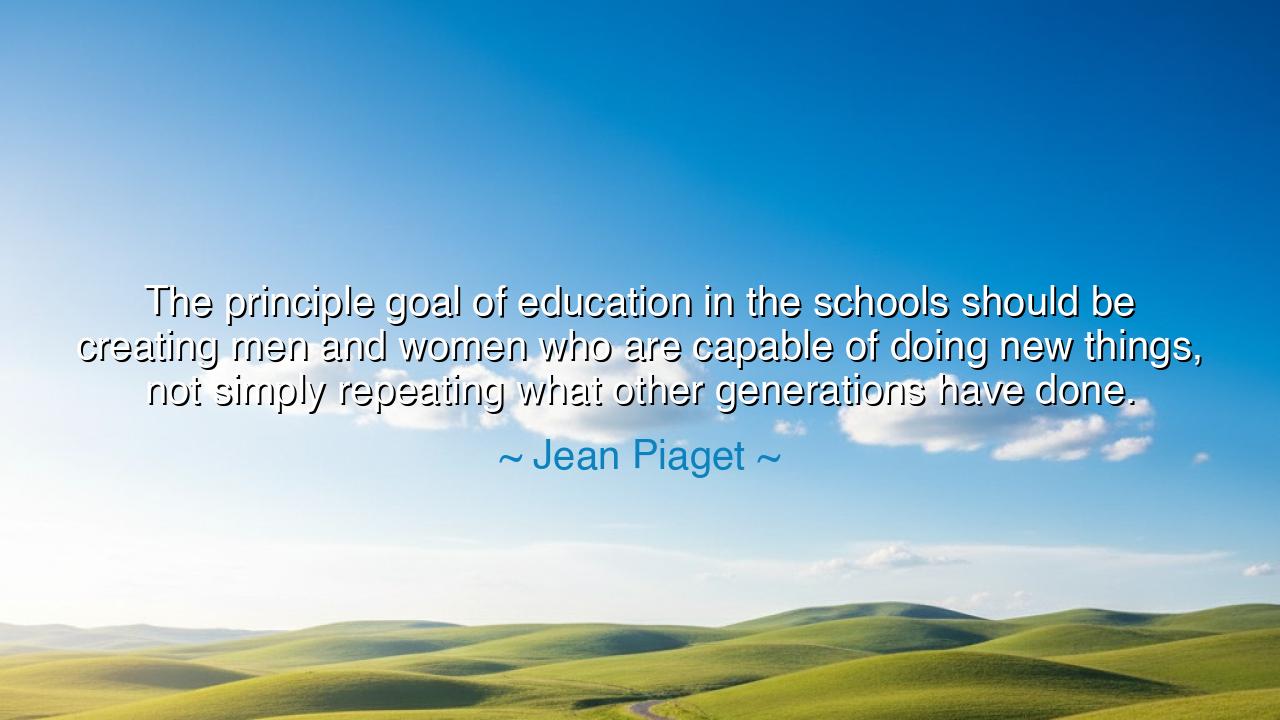
The principle goal of education in the schools should be creating
The principle goal of education in the schools should be creating men and women who are capable of doing new things, not simply repeating what other generations have done.






The great psychologist and philosopher Jean Piaget, who devoted his life to understanding how children think and grow, once said: “The principal goal of education in the schools should be creating men and women who are capable of doing new things, not simply repeating what other generations have done.” These words are not just a reflection on pedagogy — they are a timeless call to awaken the creative spirit within humanity. For Piaget saw that true education is not the passing down of answers, but the awakening of the mind that dares to question. He reminds us that every generation is called not to imitate the past, but to build upon it, to extend the frontier of knowledge and imagination.
In the ancient world, the wisest teachers understood this truth. The philosopher Socrates did not lecture his students with rigid doctrines; he questioned them, provoked them, and guided them to discover truth within themselves. To him, learning was not the memorization of old wisdom, but the birth of new understanding. Piaget, centuries later, discovered through his study of children that genuine learning happens not when information is absorbed, but when the learner actively constructs meaning. The goal, therefore, is not to raise obedient imitators, but innovators — men and women who see the world not as it is, but as it could be.
When Piaget spoke of creating “men and women who are capable of doing new things,” he was describing the essence of human evolution — the drive to create, to solve, to progress. He believed that education should cultivate curiosity over conformity, discovery over repetition. For every great advance in civilization — from the wheel to the written word, from the telescope to the computer — has come not from those who followed instructions, but from those who dared to think differently. Education that merely repeats tradition is like a river that flows in circles; only when it breaks free does it move toward the sea.
Consider the story of Galileo Galilei, who in the seventeenth century defied the authority of his time by declaring that the Earth moved around the Sun. He was condemned by scholars who worshiped ancient texts more than truth itself. Yet Galileo’s courage to think anew transformed science forever. His discovery was not born from imitation, but from the spirit of inquiry — the very spirit Piaget wished to ignite in every child. For each learner, like Galileo, must one day confront the boundaries of accepted knowledge and ask, “What if there is more?” That is the sacred moment when education fulfills its purpose.
Piaget knew that such creativity cannot be forced; it must be nurtured. A teacher’s duty is not to fill the mind, but to kindle it — to create conditions where curiosity, reasoning, and imagination may grow. Just as a gardener does not command the flower to bloom but gives it sunlight and soil, so must schools cultivate environments where young minds feel safe to explore and err. For error, Piaget said, is not failure but progress; every mistake is a step toward new understanding. The classroom that punishes curiosity kills invention; the one that honors questioning gives birth to genius.
But how easily society forgets this truth. Too often, education becomes an assembly line, molding students into replicas of the past. They learn to repeat, not to create; to fear mistakes rather than to learn from them. When this happens, a nation may produce workers but not thinkers, imitators but not inventors. The consequence is stagnation — a world that advances in machinery but declines in imagination. To cut away the creative root of education is to deny the very essence of what it means to be human.
Thus, the teaching of Jean Piaget is both a warning and a promise. The warning: that education without creativity becomes slavery to tradition. The promise: that when schools nurture originality, humanity renews itself. Let every parent, teacher, and student take this to heart — the goal of learning is not to remember what has been done, but to dream of what has never been. Encourage questions. Celebrate imagination. Dare to think differently.
For in every child there sleeps an architect of the future, a voice that whispers new truths into the world. To awaken that voice — that is the sacred labor of education. And when we succeed, we fulfill Piaget’s vision: we create men and women capable of doing new things, the builders of a brighter tomorrow, the torchbearers of the ever-unfolding human story.






AAdministratorAdministrator
Welcome, honored guests. Please leave a comment, we will respond soon